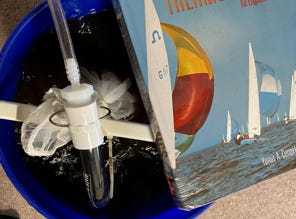Save money with compost teas
Sprinkle (or spray) soil, plant, and nutrition magic with compost tea.
Compost is often the answer in gardening. Soil too compact? Add compost. Too moist? Add compost. Building soil health builds plant health. Compost teas—brews and extracts made from compost—support soil health in many ways on an affordable scale. They contribute to long-term soil structure whereas synthetic inputs might show short-term results (and cost more).
Actively aerated compost tea and plant growth
“Compost tea” is a broad label that encompasses many different types of brewing methods and bases. One can allow a tea to “steep” for a week or 2, or provide oxygen during this brew time to grow beneficial bacteria. The latter can be done with an air pump circulator and the finished product is known as an aerated compost tea. The population density of microbes in aerated compost tea jumps significantly after 2 days of brewing, according to a 2015 study published in THE PLANT PATHOLOGY JOURNAL.
In the same study, the microbiology of 4 compost teas were tested and compared. “The mixture of oriental medicinal herbs compost and vermicompost tea had significantly higher levels of nitrogen content and microbial population density.” When applied to plants, this solution “significantly increased shoot and root growths of the tested plant such as red leaf lettuce, sweet corn, and soybean...the fresh weight of the upper part of red leaf lettuce foliage was significantly greater.”
Compost teas also reduce plant stress and increase disease resistance. The Rodale Institute implemented a 2-year study that showed a grape crop experienced 50% less powdery mildew with compost tea applications.
Compost teas are an effective way to get the most out of your compost.
Reduce fertilizer use and expense
Brewing one’s own compost tea can take 2 cups of compost—that could maybe top dress a plant or 2 in the garden—and extend it to 5 gallons’ worth of compost tea. The 5 gallons could be applied as a soil drench to dozens of plants, or as a foliar spray to hundreds. Compost teas are an effective way to get the most out of your compost.
I checked a local feed store and online retailers. The current price of a common organic liquid fertilizer is approximately $1 per ounce. This fertilizer is a concentrate that’s used at a 1:20 scale (1 part fertilizer to 20 parts water). That means you’ll have 20 ounces of liquid fertilizer to add to your garden for just $1. (And a full 18-ounce bottle would yield 360 ounces of fertilizer.) However, how far does 20 ounces go in the garden? A dozen plants? If you instead opt to brew 5 gallons of compost tea, you have 640 ounces. To get the same volume from the purchased fertilizer, you would need $32 worth. If you purchase and apply a liquid fertilizer every other week through the growing season (let’s say 6 months), that’s $576. Instead of buying fertilizer, brewing your own compost tea is free—other than startup costs of supplies and time for compost to break down and be ready for brewing.
Getting started with compost teas
Anaerobic compost teas require very few supplies. Buckets and a straining or steeping method are all that’s needed. One can use cheese cloth, a paint strainer bag, or create a strainer from hardware cloth or screens. The total cost is less than $10 (if you start with 1 bucket).
Actively aerated compost teas require a few more supplies. You’ll still need a bucket and steeping supplies, and you’ll also need an air pump, aerator (air stone or bubbler), and tubes. The total cost for all of this is approximately $123.
For foliar applications, you’ll need a pump sprayer, which are about $15 each.
If you’re planning to start a worm bin to take advantage of the benefits of vermicompost, the startup costs include a bin, worms, coco coir or equivalent, some sand, and food scraps and yard waste. This is approximately $70.
You could, however, join me at my home in Pittsboro, North Carolina on Saturday, April 26 for a Compost Tea Party, and you’ll take home your own worm bin. If you’re a paid subscriber of Tara Lynne Today, you attend for free—registration required. If you’re not a paid subscriber, you can register for the workshop for $50 or spend the same amount for a 1-year TLT subscription, which gets you free access to events like this and virtual events.
ICYMI, tea party registration is required by 4/15. Take a peek at the Compost Tea Party registration details:
March highlights and Compost Tea Party 4/26
Spend the morning learning how to brew compost teas, and take home all the supplies for your worm bin—including worms! For human consumption, enjoy a variety of farm-sourced teas and locally-baked treats during the workshop.





